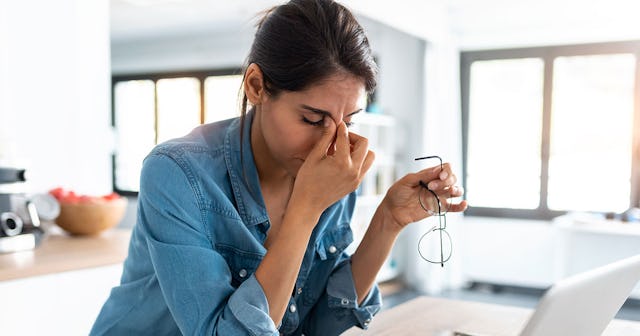The Pandemic Has Killed The Myth Of Self-Care

If you didn’t have enough time for “self-care” before the pandemic, then chances of finding it now feel slim to none.
Gone are the days where parents could rely upon family members to watch their feverish, coughing child when they were in a pinch and absolutely could not call off of work. Small businesses are shutting down due to lack of staff in some places, and employees are working absurd hours away from their families to compensate for the loss of those workers in others. Family members are sick and their care is delayed. Healthcare workers are exhausted and hospitals are overwhelmed.
Welcome to the pandemic, where everything feels like a dumpster fire, but the most common thing to be said goes something along the lines of: “Don’t forget to make time for yourself! Your mental health matters!”
As if we didn’t know this; as if time is an illusion, our schedules non-existent, and COVID eradicated.
We are stretched thin. We are caught in a vicious cycle of playing catch-up because of the added obstacles COVID has created. What used to be a small bump in the road now feels monumental. Having a sick kid isn’t likely to be just a one or two-day thing anymore. We’re more worried about our child’s physical well-being when we send them off to school than we’ve ever been before. COVID exposure and infection is draining families in every possible way. For so many of us, it’s gotten to the point where we can barely make time for the bare-minimum, absolutely-have-to-do’s, never mind the things we are told that we should do. Like, today’s idea of “self-care.”
We all know that we should make time for ourselves. We are grown enough to know what should be getting done, and yes, we are worthy and we do deserve to care for ourselves — we know. But maybe the best way we can do that is by throwing this whole idea of self-care out the window. Because what is attainable for one person is completely undoable for another, and we are setting unrealistic standards for people.
These well-meaning notions of what “self-care” should look like only widens the disparities between the rich and the poor, the sick and the healthy, the well-off and the not-so-well-off. When in reality, the invention of the term didn’t have a thing to do with planning a getaway or having a night out with friends anyway. The term was originally promoted among the medical community in the ’50s as a way to preserve institutionalized patients’ dignity by performing simple tasks like self-grooming and exercising. It wasn’t until sometime in 2015 that the term snuck its way into mainstream media and took on a whole new meaning.
With the pandemic, the idea has sort of lost its extravagance and glamour, reminding us to find solace in the little moments instead. It’s a lovely sentiment — making a cup of tea or sitting on the front porch without any distractions in the middle of a rainstorm. Or even both. But the ugly truth is this: self-care is a privilege not everyone can afford when we’re stuck in the same place that depleted us in the first place.
I’m not just talking about finances, either. Most, but not all, of us could afford a tea bag or spare fifteen seconds to take a few deep breaths on the porch. I’m talking about resources that aren’t available, help that’s not there, and a mental load that’s already exceeded it’s capacity.
In an interview with Forge, Dr. Pooja Lakshmin, a psychiatrist and contributor to The New York Times, said, “I feel like self-care has become sort of the stand-in, that everything kind of all the pressures and responsibilities for your mental and emotional well-being, have been sort of conveniently placed on the shoulders of individuals, as opposed to having a social safety net that you can lean on.”
I’m not here to be the Debbie Downer that says we can’t adapt some of these self-care suggestions and use them as our own. By all means, if you’ve found something that makes you happy and works for you, I say go for it. I enjoy feeling good about myself just as much as the next person. What I am saying is that, for some people, this kind of self-care might be too much. Like yet another chore. Like more things that we won’t get done — more “stuff” for us to feel bad later on about not doing.
We wake up with expectations for ourselves, and we go to bed with some of those expectations not being met. Every day, it starts all over again until it piles up so high we feel like we’ve hit the wall. Some of us literally cannot handle one more thing — one more expectation, one more deadline, one more “friendly” suggestion to make time for ourselves.
And even if we do carve out the time in our schedules for ourselves, most of the time, it’s not enough. As we’ve learned, self-care isn’t an end-all be-all. I believe what we are really searching for here is peace within ourselves, and we’ll reach for anything that might bring us close to it. It’s ironic though, because we’re doing the exact opposite of what it takes to attain it.
Peace is not something we achieve by completing x, y, and z. It’s a state of being. A choice, not a reward. Peace is hard to find in the middle of a pandemic. Our lives are chaotic and peace doesn’t thrive in this kind of a mess easily. We’re doing all that we can, and perhaps that’s the best kind of care we can give to ourselves right now.
This article was originally published on